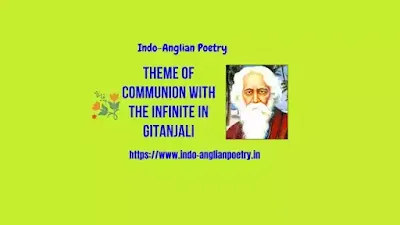Tagore is a mystic poet because of his strong belief in God, his aspiration to seek a communion with God, his belief in the immortality of soul, in treating Death as a gateway to eternal life, etc. But it would be wrong to line him up with Thomas Brown, Blake or Yeats or even with the English poet of the Romantic Revival like Wordsworth and Shelley.
 |
| Theme of Communion with Infinite in Gitanjali |
He is in the tradition of Indian Bhakti poets like Kabir, Nanak, Chaitanya, Tyagaraja, Chandidas, Vidyapati, Surdass, Raidass and others. Like all other great mystic poets. He believes in the mystery of God. He is highly imaginative; he looks for the presence of God sometimes in other objects of Nature. He is baffled at the mystery of creation and always craves like a true devotee and mystic for his union with God not only in Gitanjali but also in his other poems. Just mark a few of his mystic utterances:
1. Life of my life, I shall ever try to keep my body pure,
knowing that thy living touch is upon all my limbs.
2. I shall ever try to drive all evils away from my heart and keep my love in flower, knowing that thou hast thy seat in the inmost shrine of my heart.
3. My poet's vanity dies in shame before thy sight.
O master poet, I have sat down at thy feet.
Only let me make my life simple and straight, like a
flute of reed for thee to fill with music.
4. All that is harsh and dissonant in my life melts
into one sweet harmony
—and my adoration spreads wings like a glad bird on
its flight across the sea .
5. The evening star will come out when my voyage is done and the plaintive notes of the twilight melodies be struck up from the King's gateway.
Tagore's mysticism is neither a theoretician's creed nor a priest's preaching nor a philosopher acrobatics. But it is a practical way to life. As mentioned by J.H. Cousins, his religion is without theology, his philosophy is without argument. He never advocates a renunciation of life. His view of life is not that of an ascetic. His advice to the priest is to leave singing and chanting, and seek God where the tillers are tilling the soul or path - makers breaking stones. God is not to be found in the temple or through the secluded life of an ascetic but through love and service of our fellow - men. Humility is the virtue which the devotee must cultivate before he can enjoy the inedible bliss of God. He feels union with God through union with his fellow - men. Thus his mysticism is not a cry in wilderness. He blends his mysticism with humanism and love for Nature. He wants to seek both God and the world which is a beautiful manifestation of the Eternal Beauty of God. For him this world is a book with God's signature on every page.
Tagore does not question God's ways and designs. He simply acknowledges his greatness and glory. Everything else except bhakti is naught. Seeing God is not really his business but waiting. Union, however is also important.
Gitanjali is a deeply mystic poem. It is Tagore's spiritual autobiography and the voice of his own soul. In the words of Dr. Radhakrishnan, “The poems of Gitanjali are the offering of the finite to the infinite.” “The central themes of Gitanjali are God and Death which is a way to God. In other words, its central theme is the realisation of God through self - purification, love, constant prayer, bhakti, dedication and surrender before God, through service to humanity, and through Karma Yoga and detachment from too much worldliness without renouncing the world. Briefly speaking, Gitanjali is soul's voyage to eternity.”
To quote the words of Prof. Sen Gupta, in Gitanjali we are “in tune with the infinite”. In one lyric after another the poet explores the relationship of God and the human soul, and God is seen to be an all pervasive concrete presence throughout Tagore's song offering ‘to his Maker.’ The entire work is suffused with divine presence, and the divine is shown yearning for union with the human as much as the human yearns for union with the divine. The essential unity of man, God and Nature is again and again stressed; all discord and disharmony are resolved into unity and harmony.
